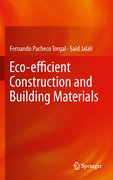
Eco-efficient construction and building materials
PachecoTorgal, Fernando
Jalali, Said
Eco-efficient Construction and Building Materials provides essential reading about materials for the construction industry in the twenty-first century. It covers the latest findings in the field, especially the toxicity aspects, embodied energy, construction and demolition wastes, the use of wastes in concrete, masonry units, materials reinforced with vegetable fibres, earth construction, the durability aspects, and also the importance of nanotechnology to the development of more environmentally-friendly materials. Based on more than nine hundred references, Eco-efficient Construction and Building Materials is of fundamental importance to academics, engineers and architects who are dedicated to the creation of a greener and more holistic construction industry. Addresses a new vision for construction materials by emphasizing the importance of their environmental impact. Covers the latest findings in the field, especially the toxicity aspects. Includes research findings that are vital to professionals in the building industry. INDICE: 1. Introduction. 2. Toxicity of Construction and Building Materials. 3. Energy. 4. Construction and Demolition C&D Wastes. 5. Binders and Concretes. 6. Masonry Units. 7. Cement Composites Reinforced with Vegetable Fibres. 8. Earth Construction. 9. Durability of Binder Materials. 10. Nanotechnology Achievements. 11. Selection Process.
- ISBN: 978-0-85729-891-1
- Editorial: Springer London
- Encuadernacion: Cartoné
- Páginas: 300
- Fecha Publicación: 31/08/2011
- Nº Volúmenes: 1
- Idioma: Inglés
